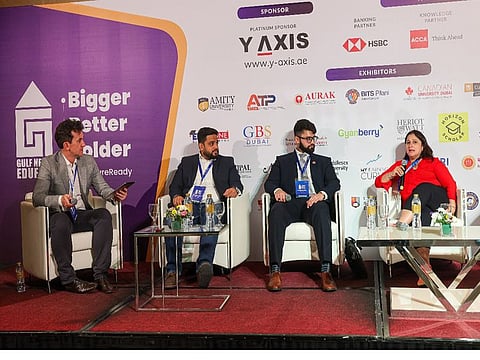Gulf News Edufair 2024: Embracing lifelong learning for career success
Panelists at Gulf News Edufair emphasise the importance of continuous skill development

The final day of the Sixth edition of the Gulf News Edufair 2024 in Dubai saw an engaging panel discussion on "Lifelong Learning - Continuous Skill Development for Career Growth and Adaptation." The discussion highlighted the need for continuous skill development and the changing landscape of education, urging students and educators alike to embrace lifelong learning as an essential component for career growth and adaptation in an ever-evolving world.
The panel featured speakers Taher Kapasi, Head of Education ACCA, Eurasia and Middle East, Mustufa Ali, Associate Lecturer at Phoenix Financial Training, and Natasha Parikh, CEO and Career Counselor at My Learning Curve. The discussion was moderated by Lachlan Kitchen.
Taher Kapasi emphasised the shifting mindset towards lifelong learning among today's students. "Today’s students are much more aware and conscious of lifelong learning, which is about adapting and building the right skill set. While many parents still emphasise getting high grades, the availability of information has shifted the focus towards lifelong learning. It’s increasingly becoming embedded in the minds of the next generation."
Reflecting on the evolution of education, Mustufa Ali shared his insights from both his student and trainer experiences. "From my experience as a student and now as a trainer, universities have significantly changed their approach to lifelong learning. Back in my day, you either attended university in person or studied online. Today, the concept of remote learning has evolved, with pre-recorded videos and platforms like LinkedIn offering courses that students can access anytime. For example, at Phoenix, we not only teach financial curriculum but also offer workshops on using spreadsheets, writing CVs, and other skills that enhance workplace readiness."
Natasha Parikh highlighted the importance of a holistic approach to education. "Academics are important, but lifelong learning is a mindset that needs to be adopted across families, schools, universities, and organizations. Universities are not just looking for high grades but also at how students apply their academic knowledge practically. With AI and other technologies, it’s crucial to upskill continually. Universities are adapting to this need by fostering environments that encourage experiential learning."
The panel also delved into practical advice for students aiming to showcase their lifelong learning skills to potential employers.
Taher Kapasi advised on the importance of networking and personal branding. "Networking is crucial. Engage in networking sessions, build your social profile, and participate in practical experiences. It’s about demonstrating curiosity, expanding your knowledge, and building confidence. Personal branding on platforms like LinkedIn can also be powerful. Your online presence should reflect your professional identity consistently."
When asked about the relevance of the traditional CV, Mustufa Ali noted that while it remains important, demonstrating a willingness to learn new skills is critical. "The CV is still important, but it's not the only factor. Showing a willingness to learn new skills is critical. Involvement in diverse projects can demonstrate your skill set effectively. It's about showcasing a learning mindset and adaptability to change."
Natasha Parikh addressed the pressures students face from parents who may not fully understand the importance of developing soft skills. "Yes, there is pressure from parents and society. It's crucial to balance academics with extracurricular activities that build soft skills. Lifelong learning is not about learning everything but focusing on quality over quantity. Participation in clubs and projects demonstrates the application of academic knowledge."
Sign up for the Daily Briefing
Get the latest news and updates straight to your inbox

